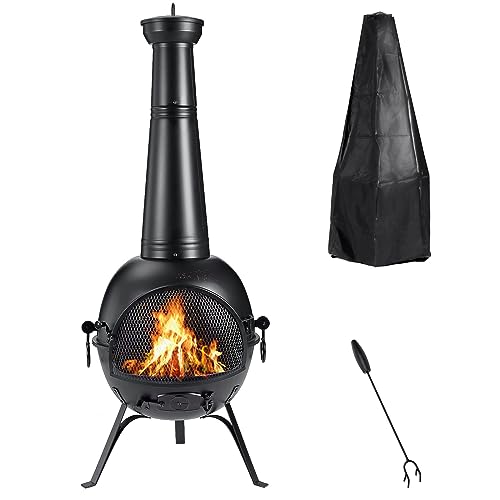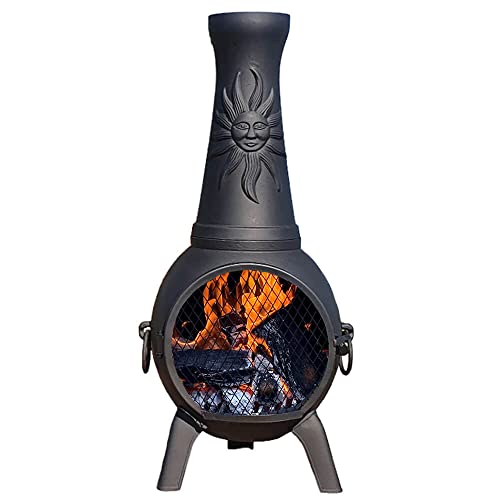"Ask Me Anything:10 Answers To Your Questions About Ceramic Chimi…
페이지 정보

본문
 The Basics of a Ceramic Chiminea
The Basics of a Ceramic ChimineaThe most popular type of chiminea is made of clay. Think of terracotta ware or red pottery. big clay chiminea is extremely strong and hard, but it can crack when handled improperly.
Clay is very absorbent, which is why it has to be protected with sand and gravel at the bottom of the chiminea along with some kindling or logs. This stops the clay from becoming too hot and prevents hairline cracks from forming.
Materials
Traditional clay chimineas, sometimes called pot-bellied ovens, come with chimneys that funnel smoke into the air. These chimneys are typically glazed to shield them from cracking and weathering due to sudden temperature changes. They are nevertheless susceptible to rain and sunlight. This is why it is essential to keep them covered when not in use and to ensure that water puddles do not form within the clay.
Most chimineas, however, are made of clay terracotta. Other materials like cast iron and steel could be used as well. Cast iron and aluminum offer a long-lasting option that requires less maintenance. Terracotta has a classic Mexican style. Some manufacturers offer modern styles that combine the beauty and durability of a clay-based chiminea.
Many people opt to pair their chiminea with flowering plants or evergreens. This gives an organic look that enhances the natural beauty of their backyard space. It is crucial to select plants that go together, as a chiminea needs to be located in a place that is free of structures that can catch fire. It is also crucial to make sure that the chiminea is located on a safe surface like brick, concrete or stone patios.
Chimines are typically constructed by hand from high-fired clay that might or may not be glaze-glazed. The person who creates the clay is known as a potter, and they can throw the piece on a wheel for a potter or using a mould for plaster. In either case, clay is kneaded prior allowed to dry. Some of the more recent clay chimineas have been pre-grogged. This is a compound which can help them resist thermal stress which can cause cracking in earthenware.
Other chimineas can be constructed using metal moulds which allow them to be made in a variety of designs and shapes to fit any backyard. Cast iron chiminea iron chimineas are heavier than clay versions, but they stand up better to the elements and are not as susceptible to cracking or breaking because of sudden temperature changes as clay. Cast iron chimineas are cheaper than other types, and are available with gas-burning options to provide greater versatility.
Styles
A chiminea is a fireplace that can be decorated with a variety styles and materials. Terracotta chimineas offer the classic design that has been around for centuries, while metal alternatives are more durable and handle high temperatures. Many chimineas for sale feature decorative patterns and designs that match the furniture of the patio. A rustic finish, for example, can give your chiminea an old-fashioned look, especially if you pair it with wood or iron patio furniture.
Chimineas can be freestanding or mounted on a patio made of brick, stone or concrete. No matter where you choose to put your chiminea, choose a location that is safe from winds and positioned away from any explosive structures or plants. It is important to keep in mind that chimineas for sale release smoke and soot that can impact the quality of the air in the area around it.
Certain chimineas feature an opening for the chimney at the base of the structure while others are pointed upwards and squat. Both designs are available with or without a wide opening to accommodate firewood. The chimneys of squat models can also be shaped to increase visual appeal and create a striking style.
You can also include decorative elements on the exterior of your chiminea like wrought iron, marble, or granite. For an added touch of style, you could consider an aluminum or copper top. These finishes reflect light and enhance the look of your chiminea.
A regular chiminea polish is a great way to protect your outdoor fire pit from damage and beautify it. Make use of olive oil, beeswax or other natural products to polish the surface for an elegant shining appearance. Apply a thin coat and rub gently after which rinse and dry the chiminea for a radiant result.
Chimineas need a lot of maintenance, but with the right care and attention, your unique outdoor chiminea can look fashionable for years to come. By implementing effective decorating and maintenance techniques you can enjoy your chiminea in the backyard all through the colder months.
Safety
Although chimineas are a popular choice however they could pose dangers to safety if they are not properly utilized. Clay chimineas, especially unglazed ones, are prone to breaking and cracking. They also pose a fire hazard when placed too close to other flammable materials like your furniture, your home and the surrounding garden. You should only utilize a chiminea in the outdoors and in an area that is enclosed or surrounded by fire-safe materials.
Always keep a fire extinguisher in your home and use it if necessary to put out small burning or hot coals that arise while you are tending the flame. It is also a good idea to use a long lighter to light your fire and to move coals around with tongs rather than with your hands. It is also a great idea to keep an empty bucket of water on hand in case you have to remove the chiminea. However, it is important not to use water to extinguish a chiminea that has been chilled down and to only add water after the fire has died down naturally or if a huge fire is in danger of overflowing the chimney.
The draft generated by a chiminea can send sparks upwards through the stack, and it is essential to shield your home and neighbors from accidental burns by using simple spark arrestors made of chicken wire placed around the top of the smokestack. Chimineas can also become extremely hot, and the surrounding area. It is recommended to put up an uninspiring wall to warn people against getting close enough to.
Do not burn your chiminea in weather conditions that are windy or rainy. The sparks could cause a chimney to catch on fire, which could cause damage to your home. Inquire with your local fire department if there burn bans in place before using a chimney. You should also clean the area around the chiminea prior to adding firewood, ensuring that there aren't any substances that can ignite around. Also, you should clean the inside of your fireplace after each use. This will help prevent the accumulation of ash that could lead to smoke inhalation or even a sooty outdoor.
Maintenance
Despite the fact that they can be used for outdoor fires however, they are not care-free devices. Like everything made of clay, they need to be handled with an appropriate amount of care to ensure their longest possible life. It is essential to not let them get too hot and to allow them to cool down between use. They should also be sanded regularly and sealed to prevent the paint from getting damaged.
The first step in keeping your chiminea in good condition is to remove the ashes from it after every use, but only once it has completely cooled down. Although it appears to be cooling down but the ash will be hot. Use small brushes and rakes to remove it. After you have carefully swept out the ash and cleared away the debris the next step would be to fill the bottom of the chiminea with either gravel or sand. This is important, because if you don't do this, the chiminea could crack. This is due to the fact that clay absorbs water and can crack if it becomes too dry.
Some sources suggest sealing the outside of the chiminea with an acrylic waterproofing agent similar to those used to seal tiles. This can prevent moisture from seeping into the chiminea and causing damage to it. It is recommended that the chiminea gets cleaned and sealed every 6 to 8 weeks during periods of heavy use.
Chimineas should be burned only on clean, safe surfaces. They should not be placed on wood decking or on any other kind of overhead cover. Utilizing only wood that is well-seasoned can also decrease the number of sparks generated and help to avoid cracking the clay.
Since a chiminea is constructed of clay it will not last forever, but it is hard to break one unless you beat it with an hit or drop it. Cracks can occur due to a variety of reasons, including poor combustion or the lack of proper maintenance. They also are susceptible to rust and need to be kept covered, at the very least, when not in use. This will keep the snow and rain from it, ensuring that it will not begin to corrode the metal parts of the chiminea.

- 이전글See What Three Wheeler Pushchairs Tricks The Celebs Are Using 24.11.02
- 다음글Five Killer Quora Answers On Wall Electric Fireplace 24.11.02
댓글목록
등록된 댓글이 없습니다.


